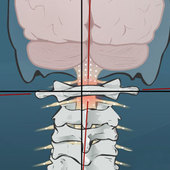As humans, we are largely reliant on our senses to allow us to navigate and interact with our environment. From a young age we were taught about the five basic senses—sight, touch, hearing, smell, and taste—however, I would like to argue for an important sixth basic sense… balance!

We all live under the constant stress of gravity. In order to be able to sit, stand, and move under the force of gravity, we rely on the very important sensory input of balance. Balance is what allows us to stand upright on two feet and move around our environment without falling down; typically, this requires very little conscious thought on our part and is often something we take for granted. However, when we lose our capacity to maintain our balance, there can be detrimental effects on our ability to perform even basic daily activities.
Our sense of balance is really orchestrated by three major systems: our eyes, our ears, and our proprioceptive system.
- Our eyes provide visual information to orient us with the horizon and determine which way is up versus down. This allows us to smoothly navigate through our environment without bumping into objects.
- Our ears contain little gravity sensitive organs that work to orient us in relation to gravity. These sensors can tell our brain if our head is upright, tilted, or moving (such as nodding or shaking) due to changes in how gravity is acting on these organs.
- Our proprioceptive system orients our brain with where our body is in space. This system consists of little sensors (proprioceptors) that detect changing levels of tension on our muscles and ligaments. Information from these proprioceptors allows us to maintain our posture and understand how our body is moving as we go about our daily activities. The largest concentration of proprioceptors is found in eight small muscles located at the base of our head and upper neck and play and important role in maintaining our head and neck posture.
When there is an incongruency of information coming from these three systems, a conflict or sensory mismatch is created in the brain. Essentially, garbage information coming in = garbage information coming out. This mismatched information can manifest in symptoms from poor balance and coordination to feelings of dizziness, headaches, and fatigue.
Maintaining our sense of balance is essential to healthy ageing and should be routinely tested. If you are concerned about your balance, talk to your practitioner to discuss simple strategies to improve your balance and optimize this sixth sense!

Dr. Michelle Speranza
NUCCA Chiropractor
The Vital Posture™ Clinic
Calgary, Canada




